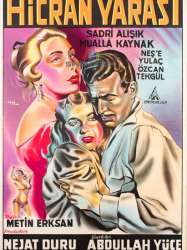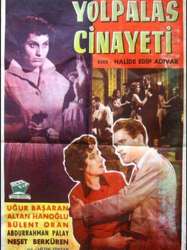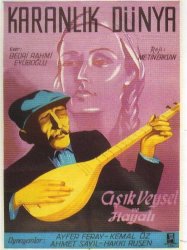Metin Erksan is a Director, Scriptwriter and Producer Turquee born on 1 january 1929 at Çanakkale (Turquie)

Metin Erksan, born İsmail Metin Karamanbey, (January 1, 1929 – August 4, 2012) was a Turkish film director and art historian.
Starting in 1947, he wrote in various newspapers and magazzines on cinema. In 1952, he debuted in directing with the films Karanlık Dünya and Aşık Veysel’in Hayatı written by Bedri Rahmi Eyüboğlu. He directed two documentary films in 1954 with the title Büyük Menderes Vadisi.
Metin Erksan gained success with films depicting the problems of people from the countryside he adopted from the literature. Susuz Yaz won the Golden Bear Award in Berlin, Germany. Yılanların Öcü (1962) was awarded in 1966 at the Carthage Film Festival in Tunisia. He was named "Best Director" with his film Kuyu (1968) at the first edition of International Adana Golden Boll Film Festival. Along with renowned film director Halit Refiğ, he was credited as the representative of the national cinema in Turkey.
From 1970 on, he directed films aimed for commercial success. In 1974-1975, he filmed five Turkish stories (Hanende Melek by Sabahattin Ali, Geçmiş Zaman Elbiseleri by Ahmet Hamdi Tanpınar, Bir İntihar by Samet Ağaoğlu, Müthiş Bir Tren by Sait Faik Abasıyanık and Sazlık by Hulusi Koray) as short films for television. His 1977 film The Angel of Vengeance – The Female Hamlet was entered into the 10th Moscow International Film Festival.
He directed 42 films, 2 of which he produced himself; and he wrote the scripts of 29 films. He also starred in the 1998 film Alim Hoca as the title character.
He died on August 4, 2012 at the age of 83 in a hospital in Bakırköy, Istanbul, having been hospitalized ten days earlier with kidney failure.
Source : Wikidata
Metin Erksan

- Infos
- Photos
- Best films
- Family
- Characters
- Awards
Birth name İsmail Metin Karamanbey
Nationality Turquie
Birth 1 january 1929 at Çanakkale (Turquie)
Death 4 august 2012 (at 83 years) at Istanbul (Turquie)
Nationality Turquie
Birth 1 january 1929 at Çanakkale (Turquie)
Death 4 august 2012 (at 83 years) at Istanbul (Turquie)
Biography
Erksan was born in Çanakkale. Following his graduation from Pertevniyal High School in Istanbul, he studied art history at Istanbul University.Starting in 1947, he wrote in various newspapers and magazzines on cinema. In 1952, he debuted in directing with the films Karanlık Dünya and Aşık Veysel’in Hayatı written by Bedri Rahmi Eyüboğlu. He directed two documentary films in 1954 with the title Büyük Menderes Vadisi.
Metin Erksan gained success with films depicting the problems of people from the countryside he adopted from the literature. Susuz Yaz won the Golden Bear Award in Berlin, Germany. Yılanların Öcü (1962) was awarded in 1966 at the Carthage Film Festival in Tunisia. He was named "Best Director" with his film Kuyu (1968) at the first edition of International Adana Golden Boll Film Festival. Along with renowned film director Halit Refiğ, he was credited as the representative of the national cinema in Turkey.
From 1970 on, he directed films aimed for commercial success. In 1974-1975, he filmed five Turkish stories (Hanende Melek by Sabahattin Ali, Geçmiş Zaman Elbiseleri by Ahmet Hamdi Tanpınar, Bir İntihar by Samet Ağaoğlu, Müthiş Bir Tren by Sait Faik Abasıyanık and Sazlık by Hulusi Koray) as short films for television. His 1977 film The Angel of Vengeance – The Female Hamlet was entered into the 10th Moscow International Film Festival.
He directed 42 films, 2 of which he produced himself; and he wrote the scripts of 29 films. He also starred in the 1998 film Alim Hoca as the title character.
He died on August 4, 2012 at the age of 83 in a hospital in Bakırköy, Istanbul, having been hospitalized ten days earlier with kidney failure.
Usually with
Filmography of Metin Erksan (11 films)
Director
 , 1h26
, 1h26Directed by Metin Erksan
Genres Drama, Fantasy, Musical
Themes Films about families, Political films, Films based on plays, Films based on works by William Shakespeare, Films about royalty
Actors Fatma Girik, Nevra Serezli, Sevda Ferdağ
Rating63%






Satan (1974)
, 1h41Directed by Metin Erksan
Genres Horror
Themes Films about religion
Actors Ahu Tuğba
Rating45%





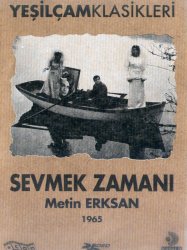
Time to Love (1965)
, 1h24Directed by Metin Erksan
Genres Drama, Romance
Actors Müşfik Kenter
Rating78%





Halil est peintre en bâtiment sur l’une des îles des Princes, un archipel dans la mer de Marmara, en Turquie. Alors qu’il travaille dans une villa, il découvre la photographie d’une femme, Meral, et tombe éperdument amoureux de son image.
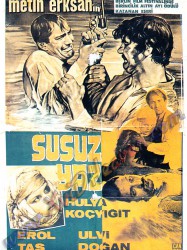
Dry Summer (1963)
, 1h30Directed by David E. Durston, Metin Erksan
Origin Turquie
Genres Drama, Crime, Western
Themes Films about the labor movement
Actors Hülya Koçyiğit, Erol Taş, Ercan Yazgan
Rating77%





Un cultivateur de tabac planifie la ruine de ses concurrents en canalisant l'eau vers sa seule propriété.

Revenge of the Snakes (1962)
Directed by Metin Erksan
Genres Drama, Crime, Western
Actors Fikret Hakan, Erol Taş
Rating76%






The White Hell (1954)
, 1h28Directed by Metin Erksan
Genres Adventure, Crime
Actors Turan Seyfioğlu, Fikret Hakan, Nubar Terziyan, Tamer Balci
Rating68%





Scriptwriter
 , 1h26
, 1h26Directed by Metin Erksan
Genres Drama, Fantasy, Musical
Themes Films about families, Political films, Films based on plays, Films based on works by William Shakespeare, Films about royalty
Actors Fatma Girik, Nevra Serezli, Sevda Ferdağ
Rating63%






Time to Love (1965)
, 1h24Directed by Metin Erksan
Genres Drama, Romance
Actors Müşfik Kenter
Roles Writer
Rating78%





Halil est peintre en bâtiment sur l’une des îles des Princes, un archipel dans la mer de Marmara, en Turquie. Alors qu’il travaille dans une villa, il découvre la photographie d’une femme, Meral, et tombe éperdument amoureux de son image.

Dry Summer (1963)
, 1h30Directed by David E. Durston, Metin Erksan
Origin Turquie
Genres Drama, Crime, Western
Themes Films about the labor movement
Actors Hülya Koçyiğit, Erol Taş, Ercan Yazgan
Roles Writer
Rating77%





Un cultivateur de tabac planifie la ruine de ses concurrents en canalisant l'eau vers sa seule propriété.

Revenge of the Snakes (1962)
Directed by Metin Erksan
Genres Drama, Crime, Western
Actors Fikret Hakan, Erol Taş
Rating76%





 Connection
Connection

